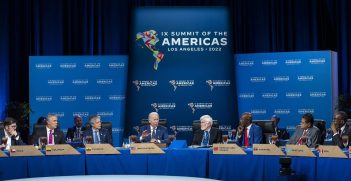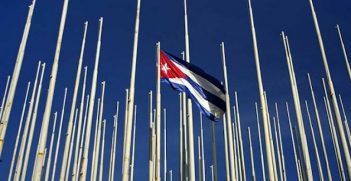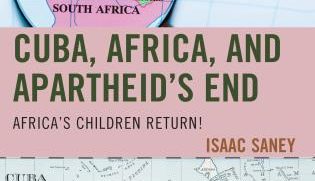2021 in Review: Raúl Castro Steps Down From Cuba’s Communist Party

Raúl Castro resigned as First Secretary of the Communist Party of Cuba. This changing of the guard is provoking local and global reflection on his performance and how it has positioned Cuba for the future.
Raúl replaced his ailing brother Fidel Castro as Cuba’s president in 2008, having together instigated the Cuban Revolution that overthrew the dictator Fulgencio Batista in 1959. Under Fidel’s leadership, Cuba allied itself with the Communist Bloc until 1989, when the collapse of the Soviet Union left the island adrift in an economic crisis it called the “Special Period.” Since then, the Cuban government has experimented with market reforms to reintegrate into the global economy, particularly since Fidel Castro’s death in 2016.
During his tenure, Raúl articulated a series of plans to boost economic growth and consolidate public support. Among his most significant pledges were to step down as Cuba’s president within ten years, to create jobs through a revitalised private sector, and to unify the island’s two currencies into one.
Assessing Raúl’s pledges
Raúl “temporarily” assumed executive power in 2006, owing to his brother Fidel’s declining health, and in 2008 he was officially appointed as Cuba’s president. In 2018, he resigned the presidency but retained the position of first secretary of the Cuban Communist Party. In this post, he never visibly instructed or controlled the new president, Miguel Díaz-Canel, but he remained influential in government. Some cited Díaz-Canel’s lack of new policies and underwhelming charisma as evidence that he was Raúl’s marioneta (puppet). Others took the view—more accurate in my opinion—that Cuba’s transition to a non-Castro presidency created deep uncertainties for the nation, which Díaz-Canel addressed by avoiding policy shifts. Either way, against the expectations of many, Raúl kept his promise to resign after ten years and facilitated a peaceful power transition.
During his presidency, Raúl often stated his intention to “update Cuba’s socialist system,” and in 2011 authorised a package of 313 economic reforms called the Lineamientos (Guidelines). Signalling new opportunities for self-employment in specific areas of tourism, education, and services, the package aimed to create jobs by linking small independent providers with large state-owned enterprises. Even conservative commentators, such as Freedom House in the United States, found that “the opening of a private sector, while still limited, is driving genuine change in Cuba.”
By the end of 2020, 127 professions had been authorised for private operation, mostly in front-line retail of food, used clothing, and plumbing equipment and services such as hairdressing and taxi driving. Advancement up the value chain for most self-employed people has been inhibited by the narrow selection of authorised jobs and by the absence of affordable and reliable supplies. A logical alternative for many is to work in the black market, where illegal supply chains have operated for decades. However, for informal sector workers, the constant risk of police inspections makes for stressful and precarious living. In this light, Raúl’s efforts to stimulate the private sector for job creation look unimpressive, but the liberalisation of 2000 occupations in 2021 merits recognition.
The new job liberalisations are an important step toward Raúl’s pledge to generate private sector employment. But the capacity of these jobs to absorb a ready workforce and improve livelihoods depends on the development of well-regulated supply chains and affordable supplies. While these challenges remain, an important step toward their resolution is Raúl’s third pledge: to unify Cuba’s dual currency system into one.
When I first visited Cuba, from 2000-2002, I lived two lives: that of a foreign student residing with a family and using National Pesos in vegetable markets and local taxis, and that of a tourist using US dollars (worth 25 times more) for the odd mojito and burger in hotel bars. When I returned in 2005-2006, the National Peso remained in circulation, but the dollar had been replaced by the Cuban Convertible (CUC), which was now required for a growing number of goods and services. I was able to withdraw CUCs from my Australian bank account, but for millions of Cubans working outside tourism and without support from family overseas, limited access to CUCs was a daily economic crisis.
After decades of hand wringing, the National Peso became Cuba’s single currency in 2021. To achieve this has required devaluation and its inevitable consequences: price hikes for goods and services and deepening inequality. Pension and wage increases for state employees have compensated to some degree, but this has not subdued critics who are currently struggling with an 80 percent decline in tourism owing to COVID-19. While currency unification enables Cuba to better integrate into global markets, fulfilling Raúl’s third promise has proven painful.
What next?
The pandemic has intensified Cuba’s economic challenges. With 88,445 infections and 447 deaths registered by April 2021, closed borders have virtually halted tourism. Moreover, COVID-19’s impact in Florida and elsewhere cut remittances, a vital source of income for many Cuban families. Under normal circumstances, remittances amount to around $8 billion USD annually, including goods acquired during trips abroad and $3.692 billion sent in cash in 2018. Taking advantage of newly rolled out internet connectivity, entrepreneurial Cubans are offering a work-around for the government’s “stay home” mandate by using WhatsApp to advertise home delivery of fruits, vegetables, meat, and fully cooked meals for those who can afford it.
A text message from a friend in Havana described COVID-19’s impact on the ground as “depressing…nobody is working and some of our neighbours don’t have anything to eat.” An academic colleague put it this way: “The memory of the Special Period is present like a ghost, though it seems things won’t get so bad this time. Biden’s victory is giving us hope in a resumption of the friendly policies of Obama’s final years.”
There are signs that the bilateral accords signed by the Obama administration in 2016—subsequently revoked by Donald Trump—may finally bear fruit under President Joe Biden. For one thing, Raúl’s resignation and Fidel’s death signify that the Castro brothers are, for the first time since the 1959 Cuban Revolution, removed from the political process. This condition meets the longstanding demand of opponents in the United States that they would never do business with Cuba while one of the Castro brothers remains in power. Should the Biden administration wish to progress trade and investment with the island, an important political obstacle has now been removed.
An Australian Outlook
By 2016 Raúl’s reforms were gaining pace, provoking Austrade to coordinate a mission to Havana led by Andrew Robb, then minister of trade and investment. As I noted in my reflections on that mission, Cuban officials who participated in the meetings informed us that the nation’s economic predicament and commercial aspirations were generating new pressures. Among these pressures, they said, was a deepening need for international partnerships to improve urban food security and infrastructure to support farms. A series of collaborative projects resulted from these meetings in response to these challenges. Funded by DFAT, one of the projects enabled bilateral visits to compare food system innovations in Melbourne and Havana, and another is currently working with an Afro-Cuban community to provide equipment to an urban farm.
It is commendable that the Australian government has remained committed to engaging with Cuba despite the attempts of successive US administrations to isolate the island. If Raúl’s resignation provokes a more conciliatory stance in Washington DC, Australian firms, NGOs, and universities will be well placed to partner with foreign counterparts who until now have been hesitant to engage.
This article was originally published on 16 April 2021.
Adrian H. Hearn is Professor of Spanish and Latin American Studies at the University of Melbourne. He is author of Cuba: Religion, Social Capital, and Development and Diaspora and Trust: Cuba, Mexico, and the Rise of China (both with Duke University Press and available for download here).
This article is published under a Creative Commons License and may be republished with attribution.





